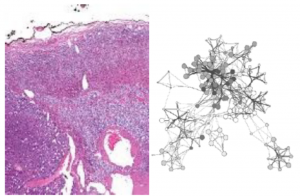
Tech ID
21-026
Inventors
X. Lin
A. Kapoor
Y. Gu
D. Tang
Patent Status
PCT filed
Stage of Research
Proof of principle data available.
Contact
Amy Hector
Business Development Manager
Gene signature for diagnosing kidney, prostate and adrenal carcinomas
Abstract
Clear cell renal cell carcinoma (ccRCC) is the most prevalent and aggressive type of kidney cancer [1]. Adrenocortical carcinoma (ACC) is an aggressive endocrine carcinoma with a 5-year survival rate of < 50% [2]. Prostate cancer (PC) is the top ranked male malignancy in the developed world [3]. For ccRCC, ACC and PC, surgery remains the main treatment; however, relapse and metastasis are common [4,5,6]. To optimize treatment benefits and reduce fatality, it is essential to know which cancers are at risk for metastasis and lethal disease. Therefore, a method to effectively diagnose patients with high risk of metastasis and lethal disease is needed.
Researchers at McMaster have developed novel multigene signature panels that robustly predict ccRCC metastasis and fatality, ACC prognosis and progression and PC biochemical recurrence (BCR).
Applications
- Clinical applications in assessing ccRCC and ACC risk of metastasis, relapse, and fatality
- Potential to significantly improve BCR risk assessment alone or together with the currently available tools.
Advantages
- Current methods for accurately diagnosing PC relapse risk, ccRCC and ACC rely on physical and clinical features, such as tumor stage and others which lack molecular knowledge. These gene signatures allow for the assessment of PC, ccRCC and ACC with a high level of precision, which is essential to optimize treatment regime for individual patients
References:
- Cohen, H.T.; McGovern, F.J. Renal-cell carcinoma. N Engl J Med 2005, 353, 2477-2490.
- Ettaieb M, Kerkhofs T, van Engeland M and Haak H. Past, Present and Future of Epigenetics in Adrenocortical Carcinoma. Cancers (Basel). 2020; 12.
- Ferlay J, Soerjomataram I, Dikshit R, et al. Cancer incidence and mortality worldwide: sources, methods and major patterns in GLOBOCAN 2012. Int J Cancer. 2015; 136: E359-86.
- Majer, W.; Kluzek, K.; Bluyssen, H.; Wesoly, J. Potential approaches and recent advances in biomarker discovery in clear cell renal cell carcinoma. Journal of Cancer 2015, 6, 1105-1113
- Gonzalez RJ, Shapiro S, Sarlis N, et al. Laparoscopic resection of adrenal cortical carcinoma: a cautionary note. Surgery. 2005; 138: 1078-85; discussion 85-6
- Zaorsky NG, Raj GV, Trabulsi EJ, Lin J and Den RB. The dilemma of a rising prostate specific antigen level after local therapy: what are our options Semin Oncol. 2013; 40: 322-36
Image obtained from: https://commons.wikimedia.org/wiki/File:Adrenal_cortical_carcinoma_-_low_mag.jpg

